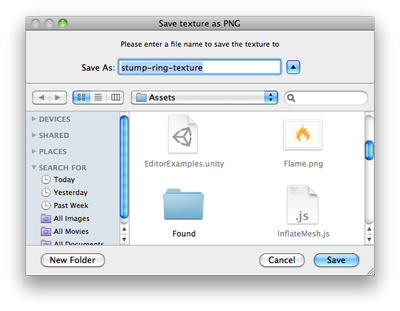public static function SaveFilePanelInProject(title:
string,
defaultName: string,
extension: string,
message: string):
string;
public static string SaveFilePanelInProject(string title,
string defaultName,
string extension,
string message);
Parameters
Description
Displays the "save file" dialog in the Assets folder of the project and returns the selected path name.
See Also: SaveFilePanel function.
Save File panel in project.
// Opens a file selection dialog for a PNG file and saves a selected texture to the file.
import System.IO;
@MenuItem("Examples/Save Texture to file") static function Apply () { var texture : Texture2D = Selection.activeObject as Texture2D;
if(!texture) { EditorUtility.DisplayDialog("Select Texture", "You Must Select a Texture first!", "Ok"); return; }
var path = EditorUtility.SaveFilePanelInProject("Save texture as PNG", texture.name + ".png", "png", "Please enter a file name to save the texture to"); if(path.Length != 0) { // Convert the texture to a format compatible with EncodeToPNG if(texture.format != TextureFormat.ARGB32 && texture.format != TextureFormat.RGB24) { var newTexture = Texture2D(texture.width, texture.height); newTexture.SetPixels(texture.GetPixels(0),0); texture = newTexture; } var pngData = texture.EncodeToPNG(); if(pngData != null) { File.WriteAllBytes(path, pngData); // As we are saving to the asset folder, tell Unity to scan for modified or new assets AssetDatabase.Refresh(); } } }